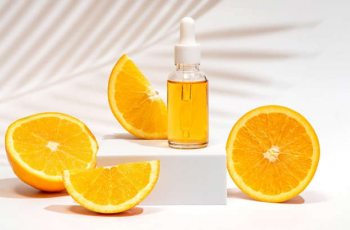
How to Get Flawless Skin for Your Wedding Day
Wedding season is a magical time filled with love, joy, and the most beautiful details—from ivory gowns and sparkling veils to soft rose petals cascading down the aisle.
If your big day is approaching, first of all—congratulations! You’re about to begin an unforgettable chapter in your life, and we couldn’t be more excited for you.
Amid the excitement and planning chaos, don’t forget that stress can quickly creep in and affect your skin in ways you may not expect or want.
Breakouts, dullness, and irritation can be caused by stress, lack of sleep, or diet changes—exactly what you don’t want when every camera will be on you.
To help you look and feel your absolute best, we’ve put together a complete guide on how to get glowing, radiant, flawless skin for your wedding day.
1. Start From Within: Heal the Inside to Glow on the Outside
Your skin reflects what’s going on inside your body, so the journey to a clear, radiant complexion starts with internal wellness.
Blemishes in specific areas can sometimes hint at imbalances—forehead acne may point to liver stress, while cheek breakouts may relate to lung or respiratory issues.
Instead of seeing pimples as just bad luck, use them as signals that your body might need extra care, hydration, or detoxification.
Cutting back on alcohol, sugar, dairy, and processed foods while increasing vegetables, fiber, and water will positively impact your skin over time.
Multivitamins, particularly those rich in zinc, vitamin C, and omega-3s, help support healthy skin function and promote natural repair and clarity.
While you might not notice changes immediately, give it three to four weeks and you’ll start to see a smoother, clearer, more vibrant complexion emerge.
2. Get Moving: Exercise for That Natural Bridal Glow
Regular physical activity is one of the most underrated ways to boost your skin’s appearance while also improving your mental wellbeing.
When you exercise, your blood circulation increases, delivering more oxygen and nutrients to skin cells while flushing out toxins through sweat.
This boost in blood flow also stimulates collagen production, reduces inflammation, and can even minimize the appearance of fine lines and puffiness.
You don’t need to join a gym or run a marathon—just 30 minutes a day of brisk walking, yoga, or home workouts can transform your skin over time.
With free workout videos available on YouTube and Instagram, it’s easier than ever to build a sustainable routine from the comfort of your living room.
The added bonus? Exercise lowers cortisol (stress hormone) levels, which helps prevent stress-related acne breakouts and dullness.
3. Be Cautious with New Skincare Products
It’s tempting to try every trending serum or miracle cream promising instant bridal perfection, but be careful with new products close to your wedding.
If you’re considering introducing something new into your skincare routine, do it at least six weeks before your wedding date to allow time for testing.
That way, if your skin reacts negatively—redness, breakouts, irritation—you’ll have time to recover and return to your previous routine.
Always patch-test products on a small area of your skin, like your jawline or behind your ear, and observe for 24 to 48 hours before full use.
Focus on adding one new product at a time to monitor how your skin responds rather than overwhelming it with a bunch of changes.
Stick with what works for you—consistency is more important than chasing instant results from a new skincare fad.
4. Treat Yourself to a Professional Facial
While we don’t recommend overhauling your skincare routine before the big day, a professional facial can offer a luxurious, skin-reviving boost.
Opt for a facial that’s tailored to your skin’s specific needs, and be sure to schedule it 4–7 days before your wedding to avoid post-facial purging.
Custom facials often include gentle exfoliation, deep cleansing, hydration, and calming masks to bring out that natural, healthy glow.
Choose an esthetician you’ve worked with before or who comes highly recommended and understands your skin type and sensitivities.
Avoid aggressive peels or extractions close to your wedding—they might leave temporary marks or cause your skin to purge just when you don’t want it to.
A soothing, rejuvenating facial not only preps your skin beautifully but also offers a moment of calm in your hectic pre-wedding schedule.
5. Simplify Your Skincare Routine for Maximum Impact
If you don’t already have a skincare routine, now’s the perfect time to build one—starting simple is better than overcomplicating it.
Cleansing twice daily, using a hydrating toner, applying a quality moisturizer, and wearing sunscreen daily forms the foundation of any effective routine.
Exfoliating once or twice a week helps remove dead skin cells and allows other products to absorb better while giving your skin a fresh glow.
Masks like a charcoal detox mask can help remove impurities, refine pores, and instantly refresh your complexion—perfect for wedding-week use.
Our favorite quick fix is a 10-minute charcoal mask that draws out pollutants, balances oil, and makes your skin look vibrant without any downtime.
Adding one or two targeted treatments like a serum or eye cream can take your routine to the next level without overwhelming your skin.
6. Prioritize Your Beauty Sleep
They don’t call it “beauty sleep” for nothing—your skin repairs and regenerates most effectively while you’re asleep.
Aim for at least seven to eight hours of quality sleep each night to allow your skin time to renew and for cortisol levels to reset.
Sleeping on your back can also help reduce puffiness and prevent under-eye bags, as it minimizes fluid accumulation in the delicate eye area.
Consider investing in a silk or satin pillowcase, which reduces friction on your skin and helps prevent sleep lines and irritation.
Wind down with a calming bedtime routine—herbal tea, meditation, or reading—so your body and skin can truly rest and rejuvenate.
Dark under-eye circles, dull tone, and breakouts often improve noticeably when your sleep schedule becomes more consistent and restorative.
7. Book Your Makeup Artist Early and Do Trials
Bridal makeup is a major part of your overall look, so finding the right artist is essential to feeling confident and radiant on your big day.
Start your search early and give yourself time to book trials with different artists until you find someone who understands your vision and preferences.
Bring reference photos, be clear about your style, and don’t hesitate to voice concerns or ask for changes during your trial sessions.
Look for artists with experience in bridal work who know how to create a look that lasts through tears, dancing, and long hours under the spotlight.
A skilled makeup artist will enhance your features, match your skin tone perfectly, and help you feel like the best version of yourself.
Feeling comfortable with your artist ensures you’re calm and happy on the day, knowing your makeup is in expert hands.
8. Don’t Forget to Smile—It’s the Best Glow You’ll Wear
Last but not least, the most powerful beauty tip is to simply smile—nothing lights up your face more than genuine happiness and joy.
No serum or highlighter can match the glow that comes from feeling confident, excited, and present in every moment of your wedding day.
You’ve spent so much time and energy planning this incredible celebration, so let yourself enjoy every second without worrying about small imperfections.
A warm, genuine smile will radiate beauty in every photo, every interaction, and every memory you make with your loved ones.
And hey—smiling even lifts your cheeks and naturally enhances your facial features without you even trying.
So take a deep breath, let go of stress, and know that you’re absolutely stunning—inside and out—on your special day.
Final Thoughts
Wedding planning can be overwhelming, but with just a few mindful tweaks to your skincare, sleep, and wellness habits, you can achieve radiant bridal skin.
Start early, stay consistent, treat yourself kindly, and surround yourself with people and professionals who support your vision and joy.
These skin prep tips aren’t just about looking flawless—they’re about feeling amazing in your skin when you walk down the aisle.
From all of us, we’re wishing you a beautiful, magical, love-filled wedding day and a lifetime of happy, glowing skin.
Now go out there, enjoy your celebration, and glow like the bride you were meant to be!

